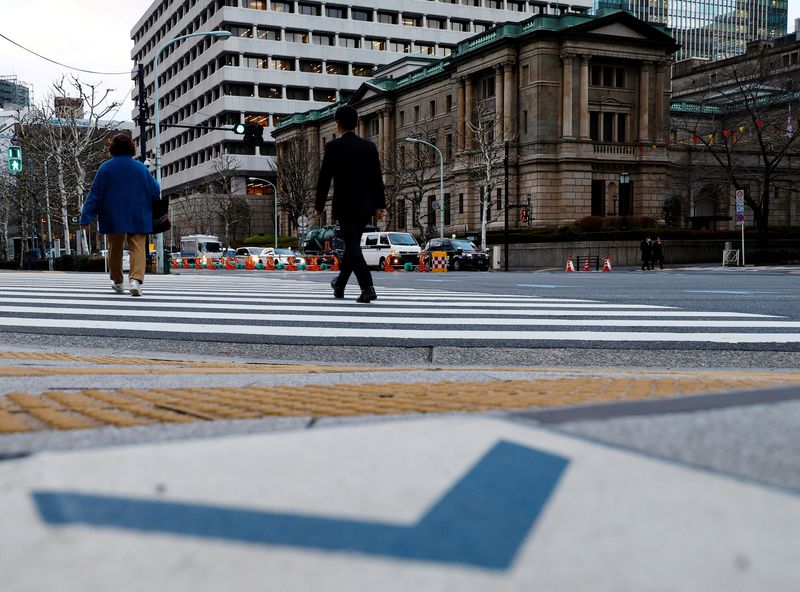By Leika Kihara
(Reuters) -Bank of Japan Governor Kazuo Ueda said the central bank should reduce its huge bond purchases as it moves toward an exit from massive monetary stimulus, reinforcing his resolve to steadily scale back its nearly $5-trillion balance sheet.
The remarks keep alive expectations the central bank could embark on a full-fledged tapering of its bond buying as early as its policy meeting next week.
In March, the BOJ made a landmark shift away from its radical monetary stimulus by ending eight years of negative interest rates and yield curve control (YCC), a policy that caps the benchmark 10-year yield around 0% with huge bond buying.
But it pledged to keep buying roughly 6 trillion yen worth of government bonds per month to stop the March policy shift triggering an abrupt spike in yields.
"We are still scrutinising market developments since the March decision," Ueda told parliament on Thursday. "As we proceed in exiting our massive monetary stimulus, it's appropriate to reduce" bond purchases, he said.
Ueda has repeatedly said the BOJ will eventually taper its huge bond buying, but offered no clues on how soon it will start doing so.
The BOJ currently has 750 trillion yen ($4.8 trillion) in assets on its balance sheet, nearly 1.3 times the size of Japan's economy, including government bonds.
On the question of further interest rate hikes, Ueda said the BOJ would move "cautiously to avoid making any big mistakes".
There was, however, less conviction from BOJ board member Toyoaki Nakamura about policy tightening amid concerns demand in Japan's economy remains fragile.
Speaking separately in the northern Japanese city of Sapporo, Nakamura, one of the board's more dovish members, said the economy may see inflation fall short of the central bank's 2% target next year if consumption stagnates.
"It's premature to raise interest rates now," Nakamura said, when asked about growing market expectations the BOJ would hike short-term borrowing costs again this year.
He also said the BOJ should not raise interest rates for the sole purpose of slowing the yen's declines, even though the weak yen was hurting consumption by increasing the cost of living.
"Sharp (OTC:SHCAY), one-sided declines in the yen are undesirable as they heighten uncertainty over the outlook," Nakamura told a news conference after meeting business leaders.
"But trying to deal with the weak yen with interest rate moves would have a negative impact on the economy," as higher borrowing costs would cool demand, he said.
Nakamura, a sole dissenter to the BOJ's decision to exit negative interest rates in March, said it was "hard to say" if the BOJ should taper its bond buying as soon as next week, suggesting he was not necessarily opposed to the idea.
"The BOJ shouldn't do anything that could cause shocks to the economy," and scrutinise how rising long-term borrowing costs could affect corporate activity, Nakamura said.
"But taking a long time to determine whether to taper would mean the BOJ would keep buying government bonds at the current pace. That would suggest Japan's economy is still in an abnormal state," Nakamura said.
Ueda has said the central bank will raise rates again if underlying inflation, which takes into account various price gauges, accelerates toward 2% as it projects.

Many market players expect the BOJ to raise rates again this year, though they are divided on whether it will happen in the third or fourth quarter.
($1 = 155.8400 yen)